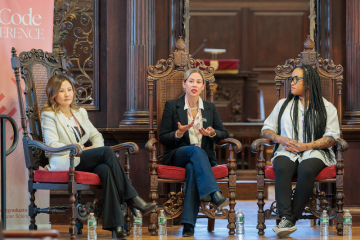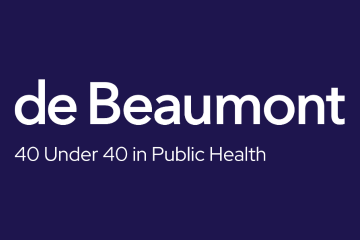Less than six months ago, I was walking across the stage at the Emory University Rollins School of Public Health, having proudly earned my Master of Public Health degree. Now, as the de Beaumont Foundation’s first Philanthropy Fellow, I continue to take steps forward, confident that the training I received at Emory has prepared me well to start my career in public health.
Like other graduates from Emory and from schools of public health across the country, my classmates and I rely upon our coursework, ranging from epidemiology to environmental health and a myriad of interesting and challenging electives, to provide the foundation for our core competencies and skills in public health. However, despite my rigorous and thorough training, it wasn’t until I attended a meeting of the Public Health Informatics Training Network (PHITN), hosted by the de Beaumont Foundation and the Public Health Informatics Institute, that I came to truly understand what informatics is and how it is relevant to my skills and interests.
This isn’t to say that the concepts were foreign to me. Not at all. In public health, data is not just our bread and butter, but the full range of ingredients we need to prepare wholesome fare to fuel public health practice. Therefore, if I take the liberty to liken my graduate program to culinary school, it’s clear as to why our priorities were focused on how to seek the highest-quality ingredients (data), how to write our recipes (methods) and prepare our dishes (studies)– and why we were less concerned with the equipment and organization of the kitchen (informatics) and the constructors and curators of our research kitchens (informaticians). Our data logisticians, knowledge architects, and information translators may often be overlooked, but informaticians are fundamental to our research, evaluation, and decision making in public health.
In my career, I aspire to engage in partnerships with other sectors to promote the health of a community as a whole and to work towards health equity by addressing the social determinants of health. But working together can only go so far if our information streams can’t connect. All of our ingredients need to make it into the same kitchen before we can start cooking. For this to be possible, I’m going to need to know how to ask the right questions, access the right data. And I realize that I am going to need help.
Each partner will bring additional complexities, such as data format, collection processes, and languages used. Informaticians can bridge these differences to allow us to find the commonalities that can lead to the most effective interventions. With the help of informatics, we are not limited by the data, but rather, we can overcome the barriers of language and fragmented structures. Research does not need to be constrained as though it were a challenge on a Food Network competition. I’d prefer to work with an informatician to understand and even influence the selection of the ingredients and equipment available and to write the menu before the shopping list, rather than limit myself to wrangling an entrée out of whatever might be in the nearest cupboard.
Public health informatics is at the heart of some of our greatest successes in public health. For example, the organization of childhood immunization data is an informatics success. These data are highly valued and rigorously collected, managed, and shared between pediatricians, clinics, health departments, and others. The impact of these data on the lives of our nation’s children is undeniable, and yet, the role of informatics goes unnoticed. Just as often, the well-stocked, impeccably-organized kitchen goes unseen and unappreciated by the dinner guests absorbed in the meal on their plates. While the guests, the consumers of this data, may not need to know how the cabinets are organized, the restaurant staff do. We rely upon informaticians and trust that their work supports a system which can reliably serve the needs of different chefs, meals, and diners. With an informatician in the kitchen, data systems can be well-utilized for a number of purposes.
Despite past accomplishments and the future public health contributions of informatics, there are obstacles in the way of truly collaborating within and strengthening this field:
- The lack of a unified message and communication strategy about public health informatics (PHI), especially around its value
- The need for defining a purpose, scope, vision for the field of PHI and its role in the public health workforce, training/education, and academia
- The importance of collaborations between multiple sectors, for data ownership and sharing, and how this is challenged by categorical funding, silo mentality, and competition
- The need for defining and accessing effective PHI tools
The very invisibility of informatics is simultaneously its greatest weakness and most promising opportunity. It is as pervasive as the data that nourishes our work, and yet ignored – to the detriment of the mission of public health.
As public health professionals, we have the power to strengthen the recognition of the role of informatics. Our field only stands to benefit if we can identify and become familiar with informatics during our training and early in our careers. Only then can we begin to generate the understanding, appreciation, and demand among our future public health leaders necessary to realize the potential impact of this often overlooked resource.
Informatics may not yet be widely considered a hot field, but the temperature is rising. While we can still stand the heat, let’s get into the kitchen.





